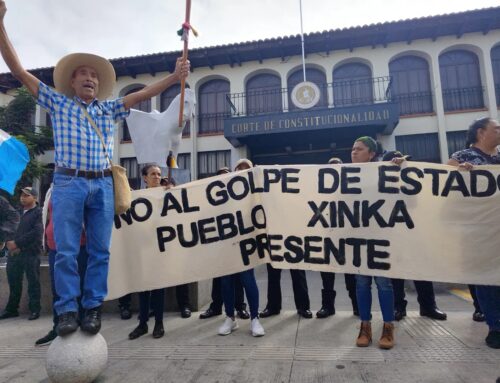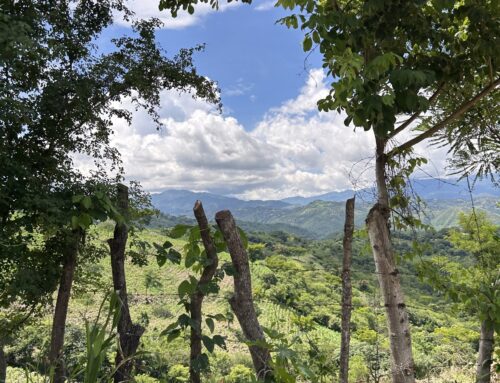More than 28 years have passed since the massacre of more than 250 men, women, and children in the small farming community of Las Dos Erres, Petén. For 17 years, survivors and family members of victims have struggled to bring the perpetrators to justice, with the support of the Guatemalan Association of Families of the Detained and Disappeared (FAMDEGUA). Yesterday, July 25, those efforts led to the opening of a criminal trial against four Guatemalan ex-military, who stand accused of crimes against humanity and the murders of at least 201 people.
Of the accused, Manuel Pop Sun, Reyes Collin Gualip, and Daniel Martínez Mendez were trained and served as instructors at the training academy for the infamous “Kaibil” special forces of the Guatemalan military. According to the prosecution, they served in an elite mobile task force which committed the massacre in Las Dos Erres in December of 1982. The other accused, Carlos Antonio Carías López, was at the time the commanding officer of the nearby military base in Las Cruces, Petén; Carías is also charged with aggravated robbery, with survivors and family members of victims accusing him of the theft of land and property from the village following the massacre.
On the first day of the trial, each of the accused delivered preliminary statements and underwent cross-examination, all denied participation in the massacre. The court heard six witnesses presented by the prosecution, including two ex-Kaibiles who gave testimony of their own roles in the massacre, placing Pop Sun, Gualip, and Mendez at the scene and describing the acts of brutality committed by the elite commando unit. Serving as protected witness, the ex-Kaibiles gave their testimony via video link in Mexico; both originally approached the UN Mission in Guatemala and FAMDEGUA in the mid 1990s to confess their participation in the massacre. When asked why he agreed to testify, one of the ex-Kaibiles said, “Because many families need it, they must know the truth.”
The other four witnesses, all family members of those killed in the massare, included a woman who worked as a schoolteacher in the village, and had left the community for her holiday vacation at the time of the massacre; and a man who was 14 at the time, and along with other family lost two young sisters who had gone to visit an aunt in the village on the day of the massacre. All the witnesses agreed that the elite Kaibil force encountered no resistance during their operation in the community, and that the villagers of Las Dos Erres were poor farmers with no links to insurgent forces.
| Ramiro Osorio Cristales, survivor of the Dos Erres massacre and trial witness, talks to reporters during a July 21st press conference in Guatemala City. (Photo: NISGUA) |
The trial continued today, July 26, with the testimony of some 20 witnesses for both the prosecution and defense. Among witnesses for the prosecution was Ramiro Osorio Cristales, who as a 5-year-old survived the massacre and was kidnapped and raised as a servant by one of the Kaibil soldiers. The trial is expected to continue possibly through the end of July.
In addition to those currently on trial, the ex-Kaibil Gilberto Jordán is serving 10 years of prison in the United States for immigration fraud, having lied about his past as a soldier and his participation in the massacre on his U.S. citizenship application. Another ex-Kaibil, Santos López Alonzo, is also detained in the United States by immigration authorities, and has given details of his own participation in the massacre.
Recently, the ex-Kaibil Pedro Pimentel Ríos was deported from the United States as an undocumented immigrant; he is currently detained in Guatemala and proceedings are advancing for a separate trial against him for his role in the massacre. During Monday’s testimony, one of the ex-Kaibil witnesses presented by the prosecution described how Pimentel Ríos left Guatemala via helicopter shortly after the massacre in order to attend the U.S. military-sponsored School of the Americas in Panamá.
A fourth ex-Kaibil, Jorge Sosa Orantes, is detained in Canada waiting an extradition hearing in August to determine whether he will be tried in the U.S. for immigration fraud, or in Guatemala, Spain, or Canada for crimes against humanity.
Coverage is ongoing in both the national and international media, please see below a selection of articles in Spanish and English which cover both recent events and the background of the massacre and historic trial. NISGUA-sponsored human rights accompaniers are observing the trial and providing protective accompaniment to key actors in the case as part of the Guatemala Accompaniment Project.
Trial coverage:
- Prensa Libre: “Testigos contradicen a militares acusados de masacre en Petén,” 25 July 2011
- Prensa Libre: “Exkaibil narra en tribunal cómo ejecutaron a víctimas,” 26 July 2011 (Este articulo está equivocada acerca del nombre del testigo exkaibil citado / This article gives the wrong name for the ex-Kaibil witness cited)
- Prensa Libre: “Familiar de víctimas de masacre relata su pérdida y pide justicia,” 26 July 2011
- El Periodico: “Testigos protegidos narran masacre de las Dos Erres,“
- Al-Jazeera: “Guatemala tries soldiers on massacre charges,” 26 July 2011
- BBC: “Guatemala Las Dos Erres civil war massacre trial begins,” 25 July 2011
- Statement by H.I.J.O.S. Guatemala
Background:
- Proyecto de Acompañamiento Internacional en Guatemala, ACOGUATE: “Larga búsqueda de justicia y conmovedora conmemoración por masacre de Las Dos Erres,” 26 February 2011
- Time Global Spin: “Guatemala’s Kaibiles: A Notorious Commando Unit Wrapped Up in Central America’s Drug War,” 14 July 2011
- Global Post: “Slow progress in prosecuting accused Guatemalan war criminals,” July 11 2010






Leave A Comment